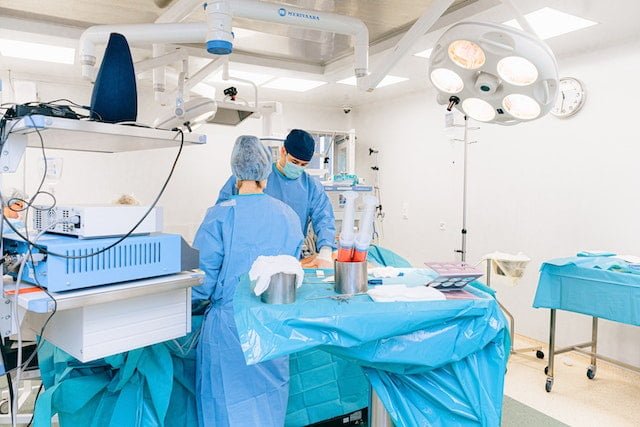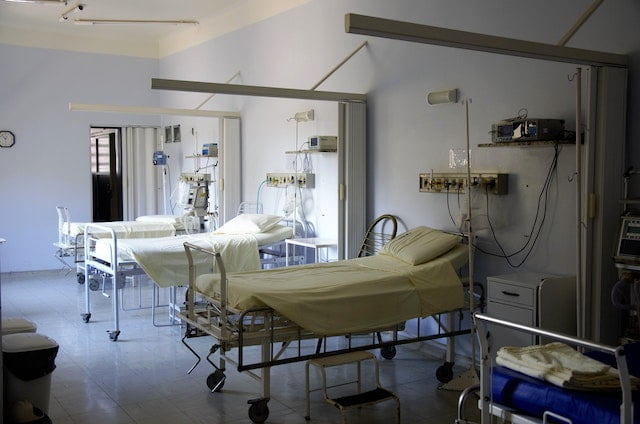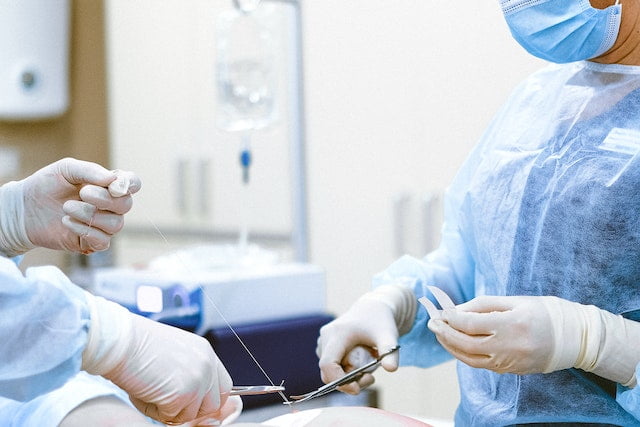While in a hospital, a patient has to be handled with complete care in order to relieve the ailment in question. This, on the one hand, requires the services of healthcare professionals including surgeons, physicians, nurses, etc. In addition, the employment of certain medical devices is also necessary as the healthcare staff cannot do much without their aid.

Medical equipment and medical supplies being used during a medical procedure
In this regard, different terms are coined for referring the hospital equipment which may seem confusing. Two such terms are medical equipment and medical supplies which are usually used interchangeably as both are considered the same. But there exist some distinctive features which differentiate both of these. Let us look into the details of these differences.
What is medical equipment?
Medical equipment includes items that improve the quality of life of a patient and make the job easy for the healthcare staff. These instruments usually last longer as they are designed in a way to provide service over an extended period of time i.e. 3 to 5 years.
Classification of medical equipment
The medical equipment, owing to its diversity, can be further classified into groups which include the following:
- Storage and transport equipment: Storage and transport of medical equipment are employed to carry medical supplies as well as equipment from place to place within the hospitals. This way, the overall functionality of the staff is enhanced as a lot of time is saved. These include:
- Storage carts
- Case carts
- Utility carts
- Durable medical equipment: Durable medical equipment, abbreviated as DME, includes items that are long-lasting and do not need frequent maintenance. These items are necessary as they provide comfort to the patients while being hospitalized or after getting discharged. DME eliminates the need for the patients to move by themselves while being under treatment thus supporting the process of recovery. DME include:
- Wheelchairs
- Traction equipment
- Lifts
- Ventilators
- Hospital beds
- Mobility assistive equipment i.e. canes, crutches, walkers, etc.

Durable medical equipment
- Diagnostic medical equipment: Diagnostic medical equipment includes all the devices used as diagnostic tools. The presence of diseases as well as the extent of damage caused by them can be easily detected by employing such machines. Examples of diagnostic medical equipment are as follows:
- Thermometers
- Stethoscopes
- Imaging devices i.e. X-ray machines, CT scanners, MRI scanners, etc.
- Procedural medical equipment: Procedural medical equipment is essential for conducting certain procedures on patients. These items ensure that the whole process is completed quickly and maximizes comfort. These items include:
- Scalpels
- Forceps
- Surgical clamps
- Operating scissors
- Headlights
- Electronic medical equipment: Electronic medical equipment encompasses all the devices which are powered by electricity and are used during surgeries as well as for maintenance of hospitalized patients. These include:
- Pacemakers
- Defibrillators
- Mobile technology carts
- Medication pumps
- Monitors
- Software i.e. medical imaging software, electronic medical records, etc.

Electronic medical equipment being used for patient health monitoring
- Surgical medical equipment: This medical equipment includes the articles which are necessary for conducting a surgical procedure. Each of these items has distinct purposes ranging from aiding as a base for the patient to lie down to holding the essential surgical instruments. This surgical medical equipment includes:
- Operating table
- Leg and arm support
- Surgical table pads
- Hampers
- Instrument tables
- Mayo stands
- Solution stands
- Kickbuckets
- Utility tables
Maintenance cost of medical equipment
Although mostly all of the medical equipment is long-lasting and does not need special care, a certain amount of maintenance cost is needed for them once in a while which may include repair of damaged segments, replacement of worn-out parts, updating to latest software, etc. This amount is allocated to the hospitals in the health budget.
What are medical supplies?
Medical supplies are the set of items and articles, used for diagnosis or treatment, which have a short-term use and are disposed of quickly once their job is finished to avoid the chances of contamination i.e. all of these items are usually single-use. These consumable supplies are either employed in hospitals or at home. The patient or the caregiver must be instructed properly about how to use such products.

Medical supplies being used during a surgical procedure
Examples of medical supplies
Some of the commonly used medical supplies include the following:
- Disposable gloves
- Disposable drapes
- Scrubs
- Alcohol swabs
- Adhesive bandages
- Scissors
- Syringes
- Towels
- Urine bags
- Urinary catheters
- Surgical masks
- Enteral feeding tubes
Difference between medical equipment and medical supplies
Medical equipment as well as medical supplies can be differentiated on the basis of the following parameters enlisted in the table:
| Parameters | Medical supplies | Medical equipment |
| Duration of use | Single-use | Long-term, usually 3 to 5 years |
| Disposability | Disposable | Non-disposable |
| Sterilization | Not recommended | Possible if needed |
| Cost covered by | Health insurance/patient | Health insurance/patient |
| Maintenance cost | None | Covered by the health budget |
Conclusion
Medical equipment & medical supplies are the essential products needed in a healthcare setup on a day-to-day basis due to their high utility. Usually, both of these terms are considered similar but they are distinct in meaning. Medical equipment includes long-lasting, highly durable medical instruments which are commonly used within hospitals while single-use, disposable items are classified into medical supplies. Both of these have their specified uses and are highly advantageous while working with a patient within a hospital or in the outpatient department.

PhD Scholar (Pharmaceutics), MPhil (Pharmaceutics), Pharm D, B. Sc.
Uzma Zafar is a dedicated and highly motivated pharmaceutical professional currently pursuing her PhD in Pharmaceutics at the Punjab University College of Pharmacy, University of the Punjab. With a comprehensive academic and research background, Uzma has consistently excelled in her studies, securing first division throughout her educational journey.
Uzma’s passion for the pharmaceutical field is evident from her active engagement during her Doctor of Pharmacy (Pharm.D) program, where she not only mastered industrial techniques and clinical case studies but also delved into marketing strategies and management skills.
Throughout her career, Uzma has actively contributed to the pharmaceutical sciences, with specific research on suspension formulation and Hepatitis C risk factors and side effects. Additionally, Uzma has lent her expertise to review and fact-check articles for the Health Supply 770 blog, ensuring the accuracy and reliability of the information presented.
As she continues her PhD, expected to complete in 2025, Uzma is eager to contribute further to the field by combining her deep knowledge of pharmaceutics with real-world applications to meet global professional standards and challenges.







